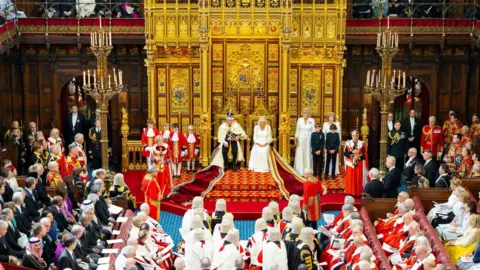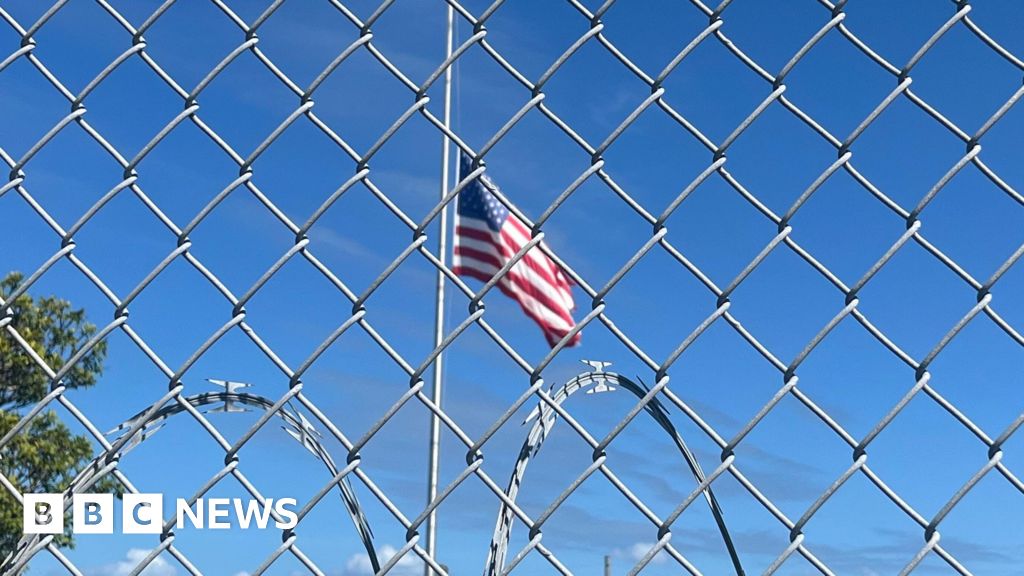30 minutes ago
By Brendan Hughes, BBC News NI political reporter

 House of Lords/Roger Harris
House of Lords/Roger Harris
King Charles with Queen Camilla at the State Opening of Parliament
Almost half of the new laws proposed by the government in the King's Speech are set to extend to Northern Ireland.
Some 18 of the 39 bills will apply in Northern Ireland under Labour’s legislative plans, which were unveiled on Wednesday during the State Opening of Parliament.
They include plans for a gradual ban on smoking, and bills on areas including immigration, cyber security and product safety.
Northern Ireland Secretary Hilary Benn said the government’s legislative programme would "deliver economic stability and kickstart growth".
Which bills from the King's Speech will apply to Northern Ireland?
In a written parliamentary statement, Mr Benn listed the 18 bills which would "extend and apply to Northern Ireland, either in full or in part".
He said the government would work with Northern Ireland's devolved institutions to secure legislative consent "where appropriate".
The secretary of state said the bills extending to Northern Ireland would be:
- Arbitration Bill - to enact recent Law Commission recommendations to reform arbitration law in a bid to support more efficient resolutions of disputes
- Armed Forces Commissioner Bill - to set up an Armed Forces Commissioner, with powers to inspect faulty kit and military accommodation
- Budget Responsibility Bill - to ensure official forecasts take place ahead of Budgets
- Banking Resolution (Recapitalisation) Bill - aimed at providing the Bank of England with a more flexible toolkit to respond to failing small banks
- Border Security, Asylum and Immigration Bill - enabling police to use counter-terror powers to tackle gangs smuggling migrants into the UK
- Commonwealth Parliamentary Association and International Committee of the Red Cross Bill - to enable the government to treat both similarly to international organisations of which the UK is a member
- Cyber Security and Resilience Bill - setting out new rules designed to protect critical infrastructure from attackers
- Digital Information and Smart Data Bill - to allow people to use digital ID to buy age-restricted products and for things like pre-employment checks
- Hillsborough Law - in the wake of the 1989 football stadium disaster, to place a legal duty of candour on public servants
- Great British Energy Bill - creating a new state-owned energy investment and generation company. The government said it would "work closely with the Northern Ireland Executive on the scope of Great British Energy's functions and opportunities for Northern Ireland"
- House of Lords (Hereditary Peers) Bill - phasing out the remaining hereditary peers sitting in the House of Lords
- Lords Spiritual (Women) Act 2015 (Extension) Bill - to prolong measures due to expire next year which are designed to boost the number of female bishops in the House of Lords
- National Wealth Fund Bill - setting up a new fund to invest £7.3bn over five years in infrastructure and green industry
- Product Safety and Metrology Bill - powers to "mirror or diverge" from EU rules to “maintain high product safety while supporting businesses and economic growth”
- Sustainable Aviation Fuel (Revenue Support Mechanism) Bill - to help decarbonise air travel by supporting the production of sustainable aviation fuel
- Terrorism (Protection of Premises) Bill - to enact 'Martyn's Law', requiring large venues to put in place procedures to deal with the threat of terrorism in the wake of the 2017 Manchester Arena bombing
- The Crown Estate Bill - allowing the Crown Estate to borrow from the government to invest in new infrastructure projects, an idea suggested under the previous Conservative administration
- Tobacco and Vapes Bill - introducing a gradual ban on smoking by bringing back the bill first proposed under former Prime Minister Rishi Sunak
'Work collaboratively'
The list of bills was released in a parliamentary statement from the secretary of state.
Mr Benn said the government would "work collaboratively with the Northern Ireland Executive to secure the legislative consent of the Assembly where appropriate".
The details emerge following the government repeating in the King's Speech its pledge to repeal the Troubles Legacy Act.
Mr Benn refused to put a timeline on repealing and replacing the legislation, which ended inquests and civil actions related to incidents during the conflict in Northern Ireland known as the Troubles.
The secretary of state said the process is complex and the government intended to repeal the law "as soon as we can".
 (1).png)
 5 months ago
12
5 months ago
12


















